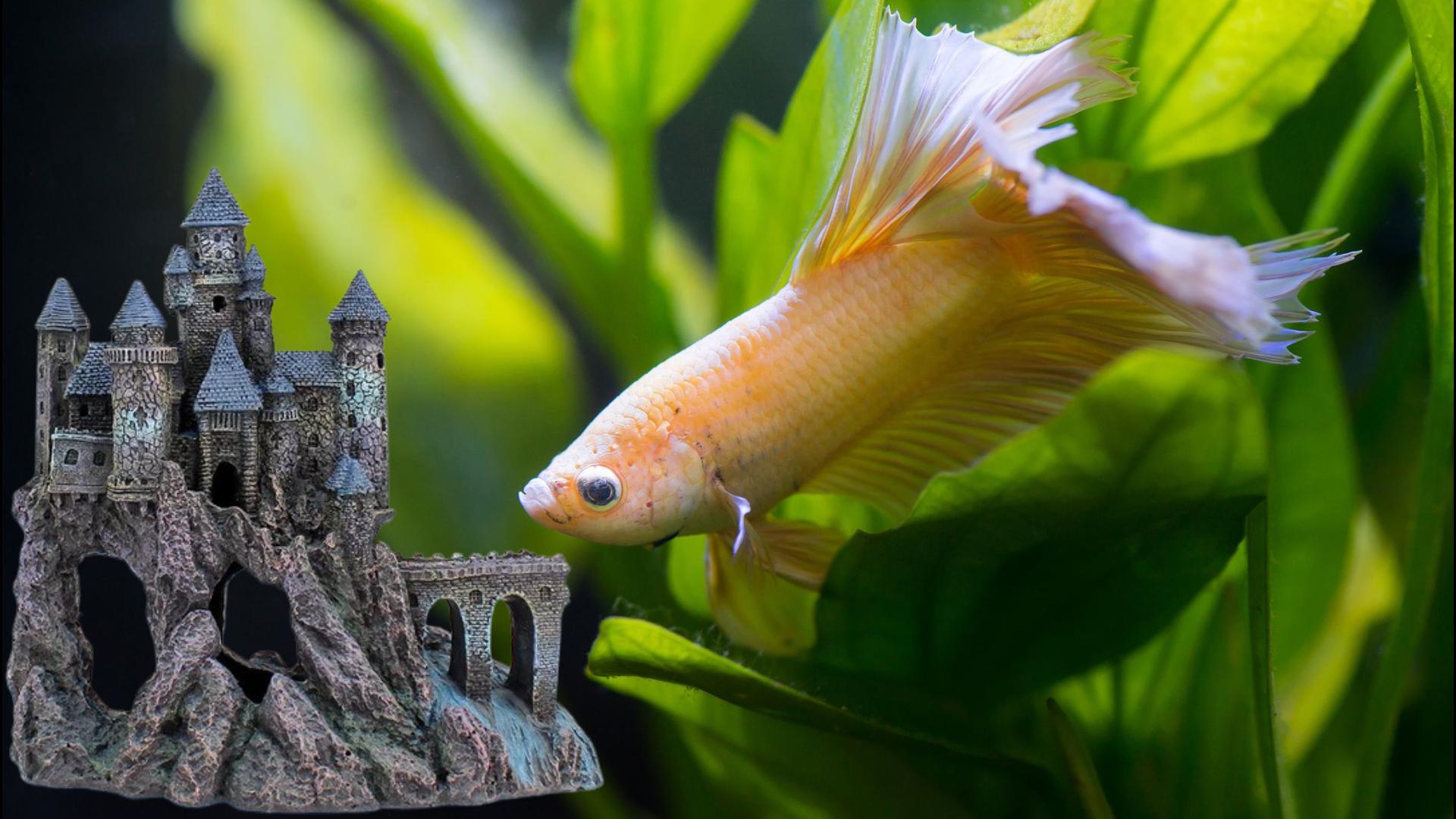This post will guide you on selecting the perfect betta fish for your next aquarium. Primarily talks about best tips on how to choose better betta fish to ensure you bring home a healthy and high-quality betta fish breed.
There is no doubt that it is better to choose a betta fish with great fins, active, and colorful. Healthy betta fish have vibrant colors, flowing fins, and smooth swimming patterns.
Look for bettas with intense and consistent hues throughout their body and fins. It’s worth noting that even healthy betta fish can be picky eaters or refuse to eat. So you can test the fish’s responsiveness by pointing your finger or mimicking feeding gestures to see if it reacts.
Betta fish that respond and are active are good choices. Try placing one other betta next to your betta fish and see if it flares during the test.
Bubbles on the surface are also a positive sign of healthy betta. It is often argued that it is just the result of betta fish maturing, but in my opinion, it is at least the sign that the fish is active.
Betta fish in pet stores and breeders are typically kept in small jars, separate from other fish. Ensure the jar has fresh and clear water, and the tank is free of debris. Pay attention to any unusual odors when inspecting the betta’s tank.
A healthy betta’s tank should be relatively odor-free. Strong, unpleasant smells may indicate poor health and should be avoided.
Which betta fish should I choose for my community tank?
When selecting community betta fish, it is advisable to choose less aggressive genetic breeds. Red or blue betta breeds are known for their aggression, so it’s generally better to avoid them in community tanks. In my personal experience, breeds like dumbo ears and white opaque betta fish are compatible with community tanks. These bettas have exhibited a good temperament and not overly aggressive behavior even when placed alongside other betta fish.
Where to buy betta fish?
When buying betta fish, you have several options. You can find bettas readily available in both dedicated pet stores and large department stores that sell pets. However, it’s essential to choose a reputable pet store that specializes in selling animals like betta fish.
I personally avoid department stores or large chain pet stores that keep betta fish in unhealthy conditions, which can lead to various health issues. The second option is to find breeders who specialize in producing high quality betta fish. While it may take a bit longer to obtain a betta from a breeder, the benefits are worth it.
Also, buying online is a better option if you’re looking for a high-quality betta. Reputable betta breeders often sell and ship fish directly to their owners. However, it’s crucial to exercise caution when purchasing online to avoid scams.
Look for breeders with a proven track record and extensive experience, as this increases the likelihood of top-quality fish. It is possible for you to import quality betta fish breeds from Asian countries like Thailand or Indonesia if you are willing to spend a little more.
But it comes with a shipping fee and you have to wait over a week for your shipping to reach you. But before going to that, let’s discuss the betta fish that you must avoid.
Fins of the Betta fish
Betta fish that are sick are the first thing to check while buying them. Unfortunately, pet stores often treat betta fish in tiny jars. Any damages to the fins, clamped fins, discoloration, or ragged edges are signs of sick or stressed fish, so avoid them.
Clamped fins look like the betta pulls its fins closer to its body. Betta fish with clamped fins can be sick and stressed due to pet store conditions. Swimming abnormally is also a sign of injury or sickness. Avoid betta fish with ragged or damaged fins, as this could be the result of fin rot, fin-nipping.
Do I recommend rescuing the Betta fish?
This video talks only about picking quality betta fish for your aquarium. If you choose to rescue a betta fish, none of the guidelines in this video apply to you. In such a case, you should follow your heart and choose the betta fish that you feel a connection to and want to give the best possible care.
Rescuing a betta fish often means providing them with a second chance at a happy and healthy life. So trusting your instincts and follow your heart.
Eye color
The eyes of a betta fish can tell you a lot about their overall health and well-being. It’s important to choose a betta fish with clear and bright eyes. If you notice that the betta fish has cloudy eyes, it may be an indication of poor health.
Cloudiness can be caused by various factors such as bacterial, fungal or parasite infections. Another concerning sign is if the betta fish has diamond or white eyes. White betta fish have cloudy white eyes, which is a genetic defect.
Also, dragon scale betta fish may have diamond eyes, which are just overgrowths of dragonscale around their eyes. This impacts their eye sight and go blind. Bulging eyes, often called “popeyes,” can be a symptom of an underlying infection or injury.
Popeye is a health condition that affects all fish, including betta fish. It can be identified by bulging your fish’s eyes. Eye swelling is caused by a build-up of fluid or infection in the eye socket. It’s important to choose a betta fish with proportionate eyes and no abnormal swollen or bulging.
Size and age
Betta fish are fully grown at 4 months. Generally, betta fish live 3 to 5 years in a healthy aquarium, so finding the right age for betta fish is essential when buying.
If you buy older betta fish, it will affect the period that minimize the betta fish time that living with you. Moreover, small size bettas may have a genetic problem or be less than 4 months old, which are better avoided because they need to be cared for differently.?
If you want to know the exact age of your betta fish, there is a video on the channel already. Please check it out.
Lethargic behavior
Inactive and lethargic betta fish are usually a signs of stress or sickness. Choosing a lethargic betta fish increases the risk of bringing home a fish that may require immediate medical attention or have a shorter lifespan. Keep an eye out for horizontal running “racing stripes” on the betta’s body.
These lines are signs of a stressed betta. Stress stripes go away once the fish is brought home and living in a quality aquarium. It’s better to avoid them if they are stressed because they need additional care to return to normal.
Genetic disorders
In my opinion, it is advisable to avoid certain betta fish genetics such as glo betta fish, bullet betta, and dragon scale. Glo betta fish are known for their vibrant and glowing colors, which are visually appealing. But they are often associated with poor health and shorter lifespans.
Genetic variations may make them more susceptible to diseases and health complications.
Bullet betta fish have gained popularity for their unique head shape and spine position. Genetic variation can lead to undesirable traits, including irregular head shapes and misaligned spines.
These physical characteristics can affect fish’s overall well-being and quality of life. Dragon scale betta fish are fascinating, but scale overgrowth around the eyes is problematic. This excessive scale growth can obstruct the betta fish’s vision, potentially leading to blindness.
Inspect the betta body
Bloating and constipation can cause a round belly in betta fish. If the betta swims tilted to one side or has difficulty swimming, it may have a swim bladder problem. Small white dots on the body could indicate Ich, while a dusty gold mist may indicate velvet disease.
These are symptoms of parasite infections. Other symptoms of illness or injury include hiding in corners or swimming irregularly. Any lumps on the body could be related to betta fish cancer and should be avoided.
Now that we’ve covered the positive things to check, let’s focus on the things to avoid when choosing your ideal betta fish.
There is no doubt that it is better to choose a betta fish with great fins, active, and colorful. Healthy betta fish have vibrant colors, flowing fins, and smooth swimming patterns which are right choice to buy.
Why Betta Fish is Perfect Pet fish?
In reality, fish might seem like the least interactive pet. It’s because you can’t pet a fish or cuddle them like a dog or take them to the park for a walk. With these limitations, why would anyone consider a betta fish as their best pet? In this post, I will break down the benefits of having a betta fish as your pet and why you should consider loving them.
1. Betta fish come in more colors.

Betta fish are known for their vibrant colors and striking fins. They come in hundreds of color and tail combinations, available at your local fish store, aquarium clubs and online. In recent days, even big pet retailers have a variety of fancy and colorful betta fish in stock.
This will give you the option to pick your favorite color and type of fish from many varieties.
2. Betta Fish have a personality.
Betta fish are naturally curious fish. These small fish are packed with big personalities. They roam around their aquarium with an angry look on their face and explore every nook and corner of your tank. They investigate new things with curiosity and like to socialize with the environment around them. It won’t take them long to recognize you.
You will soon find that your fish will approach each time you come close to aquarium. I find myself much more relaxed when watching betta fish swim around peacefully in his tank.
3. Betta fish are low maintenance
Betta fish are very low-maintenance compared to any other pet. They are perfect for the busy person who doesn’t have the time to attend to dog and cat needs or recycle 50 gallon fish aquarium setups every month.
In terms of diet, betta fish are quite adaptable; they are not very picky eaters. Also you can feed them any harmless insects like small ants, mosquitos, banana fly and anything you can find in your house. Actually it’s fun to watch them hunting live insects. But clear feeding advise needed, check my channel on how and how not to feed insects.
4. Betta Fish is in-expensive.
Betta fish are inexpensive, not only at the point of purchase, but they will also not cost you much for maintenance compared to other fish breeds.
You can purchase betta fish for a relatively low price from your local pet shop. It doesn’t cost as much to set up and fill the tank as gold fish or other reef aquariums. In this video, all the considerations are only to give your Betta fish the best life. If you are thinking of keeping betta fish in a tiny bottle or jar, this video is not for you.

5. Compact tank size
Betta fish don’t require large aquariums. An adult male betta can do great in a small as 5 gallon desk-top tank and with proper care. You can keep 2 to 3 females in a 10 gallon tank. It’s also easy to clean a betta fish tank.
Betta fish tank cleaning is easier than compare giant fish tanks. It doesn’t mean you can keep betta fish in tiny jars, I recommend keeping them in atleast 5 gallon tank for better life.
6. No pets allowed?
While many apartment buildings don’t allow cats or dogs, they still permit small aquariums and fish bowls. Even college dorms allow fish where they prohibit other pets.
Betta fish will be a great option to consider in such cases which will make you spend quality time on your fish hobby.
Do you know Aqua Diary has a website with a lot of fish care blogs and product recommendations? Check out the pinned comment for detail.
Also don’t forget to subscribe and hit the bell icon. It will help our aqua diary betta community grow and spread awareness.
7. You can even have only one fish
A great thing about betta is that you can keep one solitary betta fish in the tank, and they will live just as happy. Often people say betta will get lonely; In reality, betta will never be lonely, but they will get bored. You can add various tank decorations, caves, and plants for them to avoid boredom. In fact, having them alone might even be beneficial, as they will have enough space to live properly, which is the primary goal when owning a betta fish.
This would make the betta more peaceful, but also stop fighting with other fish.
8. Bettas are hardy fish.
Betta fish can survive in a variety of conditions. What sets them apart is a special organ known as the labyrinth organ, which enables them to breathe outside of water. This allows betta fish to survive outside of water for longer periods than most other freshwater fish.
You may have heard stories or even personally experienced where a betta fish jumped out of its tank and remained alive for over 10-15 minutes. The primary reason behind this is the betta’s labyrinth organ, which makes them breathe outside of water.
9. Bettas are great vacation pets
If you’re a frequent traveler, betta fish are an excellent choice as they are low-maintenance pet. Their adaptability to tank environments allows them to survive with infrequent feedings and water changes. If you’re planning short trips, it’s absolutely fine to feed your betta fish before your departure and leave them fasting for up to two days until your return.
Actually this fasting period will help reset their digestive system and maintain their overall health. While bettas can go without food for up to two weeks, it’s important to note that this doesn’t mean you can go on a two-week vacation without planning for their care.
Proper preparation and care are still essential to ensure your betta’s well-being during your vacation.
10. You can teach betta fish tricks.
It’s possible to train Betta fish to do tricks. You can see some of my betta fish doing tricks in my past videos; they are actually quite easy to teach with some patience. Betta fish can be trained to jump, swim through tunnels, run into hoops, push balls, and more. They’re quite intelligent compared to other fish varieties.
If you have the patience and time, you can teach betta fish tricks like jumping out of the water and touching your finger, swimming through a hoop in their tank and following your finger. If you are interested in knowing about training your betta fish, visit the this post for full detail about teaching betta tricks.

11. Bettas Can Live for Years
It’s a common misconception that betta fish have a relatively short lifespan, typically lasting between 6 to 12 months. In reality, betta have the potential for a much longer life, spanning from 3 to 5 years provided they receive proper care and attention. From my personal experience,
I once had a betta that lived for nearly five years from the time of its birth, making it the longest-lived betta fish in my care. But some petkeepers report that their bettas live over 7 years. Please add a comment about what is the longest betta fish have lived with you.
12. Bettas are easy to care
Betta fish are easy to care for compared to other fish types. Once your aquarium is set up and established, betta fish require only an hour or two of work each week to clean their tank, 20% water change, test their water quality, check their temperature and just a few minutes for daily feedings. But mainly, spend time with them during feeding and also by adding some plants, caves and hiding spots in the tank to avoid boredom. Video version this blog post available here.





